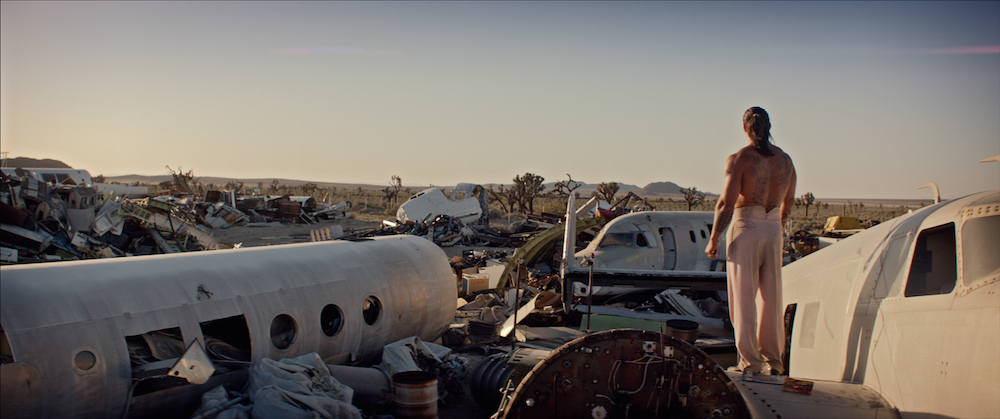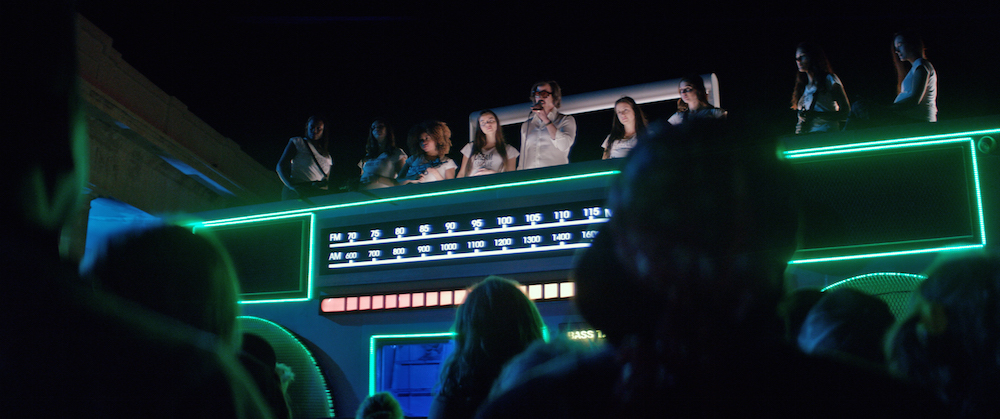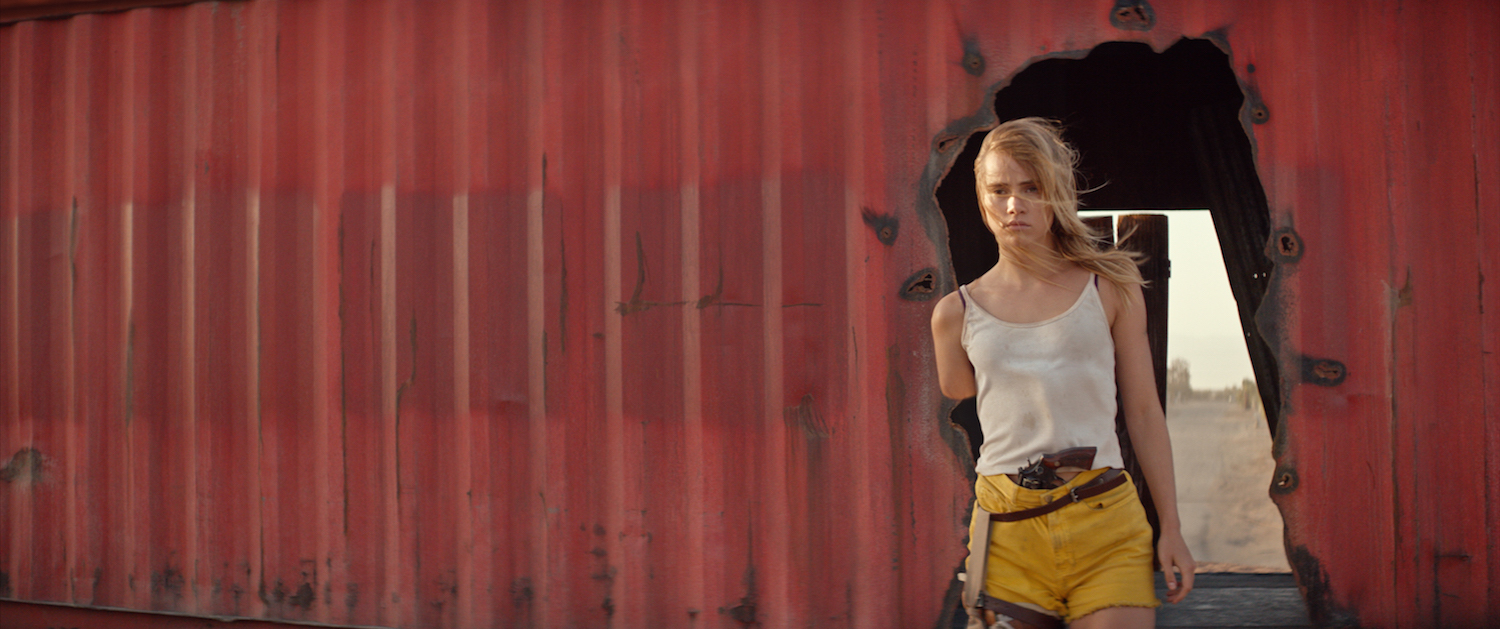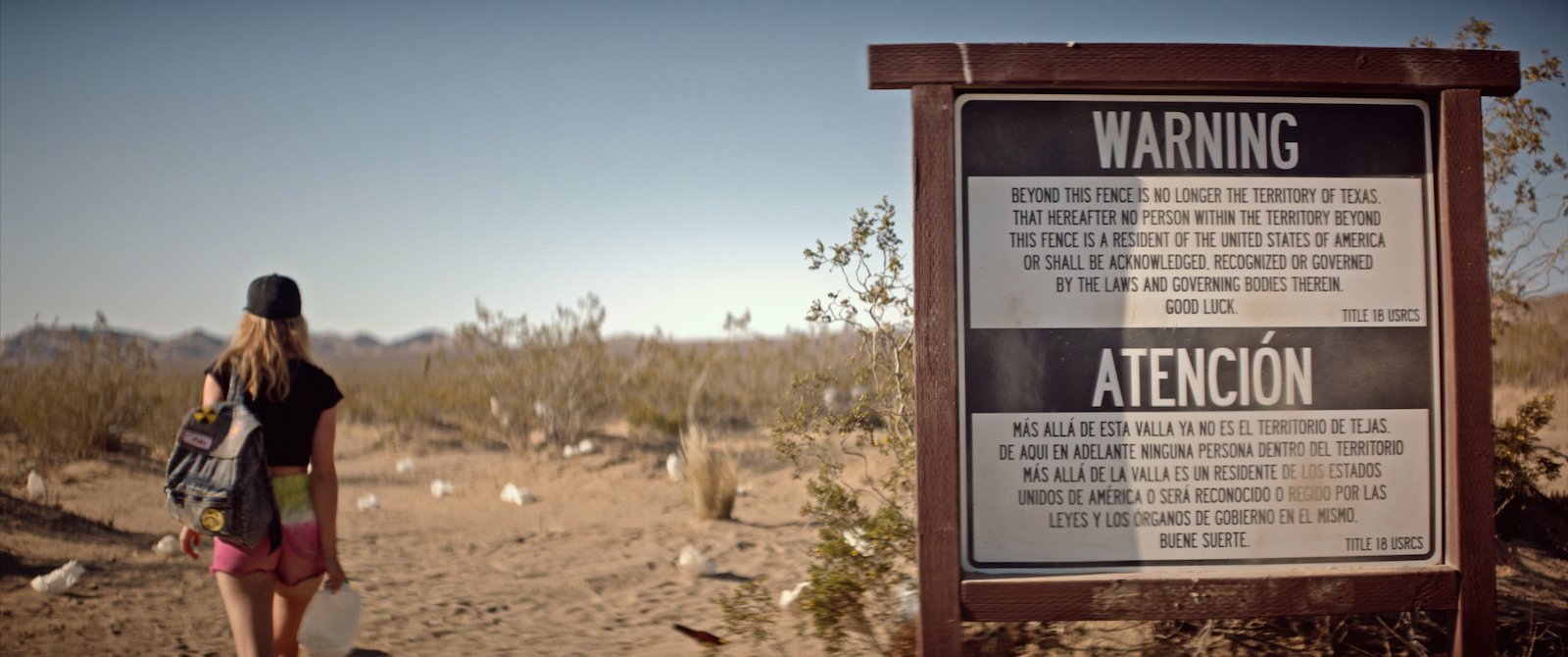Ana Lily Amirpour’s highly anticipated followup to Iranian skateboarding spaghetti western A Girl Walks Home Alone at Night is in many ways a savage love letter to the crusty Californian badlands where she came of age. The Bad Batch is also a total 180 from Girl: It’s more expensive, it’s in English, it’s in color, and it only features one skateboard scene. This comes about 10 minutes into the movie, when Suki Waterhouse, as limb-challenged miscreant Arlen, escapes from a camp of cannibal weightlifters after having her arm and leg hacked off to the tune of Ace of Base’s “All that She Wants” blasting from a nearby boombox.
Ana Lily is a bit reluctant to call The Bad Batch post-apocalyptic. Sure, it’s set in a waterless Texas wasteland filled with iron-pumping limb-munchers and the discarded dregs of Americana – including Statue of Liberty Halloween costumes, ripped Smiley Face jorts, broken American flags, bad tattoos, psycho rave cults, and rickety skateboards. But the America it envisions is one where the orange man, as Ana Lily says, is still in the White House. If anything, The Bad Batch has more in common with Back to the Future 2 than Mad Max Fury Road. Making predictions about the world can be inherently political. Ana Lily wrote her new film not after the election but after some “broken heart shit” left her feeling eaten up by life and incomplete. But Arlen isn’t broken – she’s a badass cannibal-killing anti-hero, or as Suki puts it, “a hardcore ninja gangster type.” We talked to the director and actress about periods, Burning Man, and being lonely.

What initially drew you to Arlen?
Suki: How could you not be drawn to a role like this? It’s like the psychedelic fairytale of your dreams. Just to be out in the desert, and in Lily’s universe.
Girl was set in an Iranian ghost town called Bad City, but really filmed in California. What draws you to these crusty American wastelands?
Ana Lily: So far it’s been really crusty, desert, badlands, left for waste. There’s definitely something about ruin porn that I’m attracted to in America. If you leave the cities, and go in an hour or two in any direction, you come across small, fallen away places where people are.. It’s almost like a past decade, while people are living 10 or 20 years ago. I just think it’s really interesting. Spending time there – that is America.
Did you grow up in the desert?
Ana Lily: I grew up in Miami. Then I moved to California, to Bakersfield. I had my first period there. When people are like, “Where did you grow up?” For me, it’s like, where I had my first period, I’m connected to that.
Suki: Mine was on a summer camp. I already had food poisoning and was desperate to go home. I was like, “Please!” It was terrifying. It was really blood and guts.

What inspired you to make this film?
Ana Lily: What inspired it was this feeling, like I had got chopped up and eaten up by life. At the point where I started writing the story, I just had this image of this girl missing an arm, missing a leg, and bleeding in the middle of the desert. But alive, and clenching to survival. That was the beginning of the story, so then it was kind of looping onto the world and the universe of when that moment existed.
Was it something in your own life?
Ana Lily: Just broken heart shit.
You were probably still writing Girl.
Ana Lily: I was editing. I had finished Girl, and I was editing when I started writing The Bad Batch. I needed an escape.
How much do you care when people graft their own political interpretations onto it?
Ana Lily: I was just like, “What would happen if we give into this extreme logic of how to manage modern American society?” It’s freaky. I mean, look at Robert Zemeckis in Back to the Future 2. I don’t think that movie was trying to be political, it was in the 80s, but look at the bad future that he envisioned for 2015. It’s weird. Do you remember Back to the Future 2?
I wrote for a men’s magazine around the time of Back to the Future Day and we had to cover it obsessively.
Ana Lily: [Suki] hadn’t seen it!
Suki: I went on a Back to the Future binge.
Ana Lily: I quote that movie way too much. But look at number two, it’s kind of trippy. And the Cubs won the world series. He was off by one year. It’s trippy because [The Bad Batch] is super close in time. I wrote it three years ago. So it’s weird to have a wall, suddenly. We’re talking about the orange man in the White House, right?
Yeah. Many parts of the film can be read as direct references to what put him in the White House.
Ana Lily: It’s not like a light switch flipped in January. The reason I wrote this is because people are able to divert their attention wherever they want. People were a little bit complacent for a while, and not paying attention.

It seems as though you’re inspired by music as much as politics. I was listening to Nicolas Jaar’s “Heart” while walking down the arid wasteland of Kent Avenue. It’s one of my favorite-ever songs.
Ana Lily: A lot of my writing starts with music. I sometimes will have music before the scene. It might be the feeling of the scene, or the feeling of this girl. There was actually way more music to begin with. I gave Suki playlists. I give everybody the music before. I write it into the script. I walk around with a boom box on set.
Suki, how did you prepare for this role physically and mentally? It looks mega intense.
Suki: Lily wanted to know that I could crawl on the floor. She would make me pretend that I didn’t have two limbs, and I’d crawl around on the floor in her house.
For the audition?
Suki: No, after that. She’d be like, “Faster!” Then we shot guns, and that kind of stuff. When it got to it, we just drank a lot of Gatorade, basically.
Ana Lily: She’s being casual about how physical this role was. She’s in every scene in the film. It’s hours of prosthetic makeup every day.
Suki: But you’re grateful for that kind of stuff. It’s always a part of you. She’s a hardcore ninja gangster type.
She’s a hardcore ninja gangster but still a human female. There are some pretty poignant moments, like when Arlen gets the kid to put her eyeliner on, or when she cuts the model’s arm out of a magazine and pretends it’s her own.
Suki: She misses her arm. Even in the wasteland, you’re still hankering after the nice idea of having your arm back – how you used to look. She doesn’t feel complete.
Loneliness is a huge theme in this film, and in Girl, but neither of you seem at all like introverts.
Suki: I remember Ana saying early on, ‘Loneliness is underrated,’ or something. That always stuck with me. There’s so much joy in being alone.
Ana Lily: I generate most of my power from solitude, and being alone. At the end of the day, I don’t think there are that many people I connect to meaningfully.
Suki: One of the reasons I have to keep making films is because I don’t feel like it’s enough to be hanging out with your friends and chatting shit – I crave something more. Let’s bind together and do something fucking difficult. Then you have some lifetime connection with someone.
That’s what I love about the dialogue in this film. No one talks just to fill silence.
Suki: There’s not a lot of certainty in it. Everything’s not spelled out to you. There’s a lot of space. But with empty space – with words that have already been spoken, you can’t really ever tell a new story through what you say. You can say new things to each other through silence. There’s so much freedom in two people looking at each other.
So what’s next for both of you?
Suki: I’m going to Glastonbury on Friday. I’m doing the worst thing. I’m going to a festival for two nights, then on Monday morning I’m flying back here.
Ana Lily: I’m doing the opposite of that. I’m going to take Xanax and lay on my couch and watch the OJ documentary. I might watch that then watch The Handmaid’s Tale.
Suki: I’m going to go and just like, express myself fully at a festival. I’m going to Burning Man.
Ana Lily: We’re both going to Burning Man. By then I will have recovered. I’m feeling very physically depleted at this moment in time. I’m going to a sweat lodge. It’s for an hour — they put you in a bag and you sweat and you feel detoxed. You come out and your eyes are whiter. It’s intense.
Credits
Text Hannah Ongley
Images courtesy of Neon
